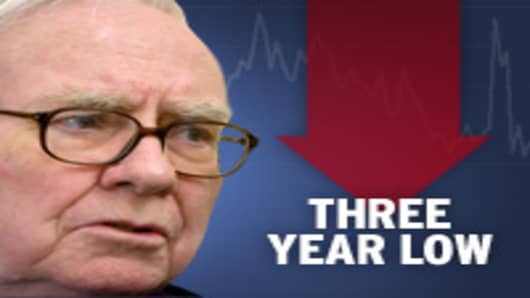Warren Buffett's Berkshire Hathaway fell just over 12 percent on Wall Street today (Wednesday), its biggest one-day percentage drop since 1987's 'Black Monday' over 21 years ago.
Berkshire lost $11,550 today at close at a three-year low of $84,000. That's a 12.09 percent decline, the second-largest daily drop ever for Berkshire, trailing only its 18.51 percent plunge on Monday, October 19, 1987. It closed that day at $3170, down $720.
Berkshire shares have dropped 43.7 percent from their all-time closing high of $149,200 on December 10 last year.



